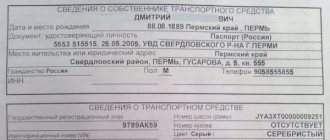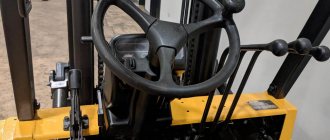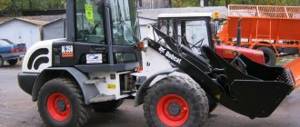Basic conditions for obtaining rights to an excavator
The main condition for training to operate a crawler excavator is that the person has the appropriate education, obtained after completing a full theoretical course on the operation of a self-propelled machine. In addition, this document must be certified by the state, as evidenced by legal admission.
If the necessary documents are available, a citizen can apply to a driving school. But it should be remembered that not all training institutions have a license to train machinists. Therefore, in order to obtain a license for an excavator, you need to look for a specialized institution, after which you will not have any further problems with the registration of the crust.
Category of rights to an excavator
When contacting a driving school, many drivers ask the same question - what category is needed for an excavator? The answer to this will depend on the characteristics of the selected self-propelled vehicle. After all, there are four classes of equipment, differing in load capacity and power:
- B – light forklifts, pipe layers and other specialized vehicles on a wheeled or tracked base, with a power unit up to 25.6 kW;
- C – wheeled excavators and horizontal loaders, with a motor from 25.6 to 110.3 kW;
- D – middle class self-propelled vehicles, with engine power over 110 kW;
- E – heavy mining excavators on tracks (the characteristics of the internal combustion engine do not matter).
It is important to know! Of the listed categories of rights to an excavator, the most common are those marked C, which allow you to drive light self-propelled machines. For heavier equipment, the requirements for drivers will be higher.
Why does an excavator driver need a license?
A modern backhoe loader is a self-propelled machine whose travel speed can reach 50 km/h. Operating such a mechanical unit requires special knowledge and skills. Without them, the excavator driver may not be able to cope with this vehicle in dangerous, emergency moments. The excavator operator's rights indicate that:
- he has received the necessary amount of information on operating such a self-propelled vehicle,
- the rules of behavior in critical situations have been learned,
- The driver is responsible for complying with safety requirements while driving an excavator.
Lack of rights or non-compliance with their category entails administrative and, in some cases, criminal penalties. It is borne primarily by the driver of the vehicle, and in addition to him, by the official responsible for compliance with safety and labor protection requirements at the enterprise. The penalty depends on the nature of the violation, as well as on the consequences that it entailed.
Where do they study to become a driver?
It was previously stated that an excavator driver’s license can only be obtained from an institution that has the appropriate license. On the territory of the Russian Federation this may be:
- Specialized centers;
- Driving schools that include loaders and tracked vehicles in their fleet.
On average, a theoretical course on the operation of self-propelled vehicles lasts about 45-60 days. But practice may take 3 months, since during this period drivers must learn to operate both the transport itself and its individual units. Upon completion of training, all drivers must pass an exam at Gostekhnadzor. Only after this will they be able to receive a rank and begin working at the enterprise.
Driving lessons
The course program contains general theoretical knowledge about the design of self-propelled machines, technical concepts about their operation, and safety rules when operating an excavator. The theoretical part of the course is supplemented and supported by practical exercises, which allows you to master the basic elements of vehicle control and learn how to perform the necessary set of operations related to this control.
An organization providing training in the operation of an excavator or other special equipment must have a certain material and technical base for this, which includes:
- special equipment for each category to be trained;
- management training platform;
- training license and government approval.
Excavator driver training courses are included in the curriculum:
- basic information about the structure and operating principles of excavator equipment of the required configuration;
- precautions when working with vehicles and at production sites;
- mastering practical skills in working with an excavator and working equipment;
- theoretical information about the types of soils and rocks that need to be worked with, and the features of working with them.
Taking courses and receiving a certificate of completion of a licensing program does not mean that you can work on an excavator of any modification.
Training period
The duration of training in most cases depends on the level: professional, retraining or advanced training. It will take about 3-4 months to obtain a state-issued excavator driver's license. It is not always possible to pass the certification the first time; some require several attempts.
For information: professional development and retraining takes much less time - from 2 to 6 weeks. Distance learning or correspondence is allowed if it is not possible to take time away from production. However, this is only a theory, because you cannot do without practice.
Cost of education
The price of education in Russian cities varies greatly, on average from 11 to 16 thousand rubles. Often schools offer additional practice, costing from 2.5-4 thousand for one lesson on an excavator. Distance courses are cheaper, but without practice, passing the exam will be much more difficult.
It is impossible to operate heavy self-propelled equipment without knowledge of the design and operation of the machine and practical skills. To master a new working profession, you must undergo training and pass exams at Gostekhnadzor.
Increase in rank
Operators of self-propelled vehicles who plan to work with more powerful equipment undergo advanced training. After training, a certificate (and on its basis - a document from Gostekhnadzor) of the 4th class is issued. The driver can operate an excavator with one bucket with a volume of up to 0.15 cubic meters. If desired, the capacity of digits increases to 8.
To improve your qualifications, you need to undergo training (retraining), and then pass exams at Gostekhnadzor. Working on more powerful models of self-propelled vehicles requires more experience and is more difficult, so the salaries of such specialists increase. After completing the courses, you need to be a driver’s assistant for some time and gain work experience, only after that you can apply for the position of operator.
Exams
The following persons are allowed to take the exam for the right to independently own a vehicle:
- a) at the age of 16 years and older for self-propelled vehicles of category “A I”; 17 years old: “B”, “C”, “E”, “F”; 18 years – for self-propelled vehicles of category “D”; 19 years - for self-propelled vehicles of categories “A II”, “A III”; 22 years old - category “A IV”;
- b) have passed a medical examination and have a standard medical certificate of approval for operation of vehicles of the relevant categories (hereinafter referred to as the medical certificate);
- c) who have received professional training or have undergone training in specialties (professions) related to the management of self-propelled vehicles of the relevant types.
This ensures continuity of operation and avoids downtime caused by breakdowns.
Excavator driver certificates are issued after successfully passing examination tests. Like training, they are divided into 2 stages - theory and practice. During the theoretical part, the future machine operator must answer questions on the ticket to demonstrate his knowledge of the safe operation of the machine, traffic rules and other basics.
In practice, it is necessary to demonstrate driving skills and the ability to operate a self-propelled vehicle, but this stage includes 2 stages:
- You will need to practice the exercises on the race track.
- Work on a work route that is prepared specifically for the exam.
All data obtained during training is recorded by the inspector.
The validity of a driver's license for self-propelled vehicles is 10 years. This document must then be replaced with a new one, which will be valid at the time of replacement.
Training in a driving school with excavator and specialized equipment
Regardless of what kind of license you need (for a loader or an excavator), the teaching methods at a driving school will not be different. It consists of the following stages:
- Study of vehicle controls, the meaning of its sensors and indicators, familiarization with technical characteristics and possible breakdowns;
- Studying safety rules when working with specialized equipment (both during operation and during maintenance);
- Practical course on replacing basic consumables (performed on a mock-up or on real equipment);
- Driving on a prepared site (carried out in a car of the appropriate category, under the supervision of a master).
Attention! For all the listed activities, the driver will have to pay about 2,000 rubles. Well, for those car enthusiasts who want to buy the rights to an excavator, this amount will at least double.
What does the training program in our company include?
Excavator driver courses at our institute are a guarantee:
- That you will fully study the theoretical basics - how to operate, maintain and repair excavators.
- You will undergo special practice.
Once the course is completed, you will learn the following important questions:
- Materials Science and Electrical Engineering.
- Classification, technical parameters, types of attachments.
- What types of soils are there, rules for developing and loading soils and bulk cargo.
- Rules for constructing pits, trenches, etc.
- How to identify and fix problems with an excavator.
- What conditions and labor safety standards must be observed?
- How you can use additional devices and devices, instruments for control and measurement.
Retraining and upgrading
Having a Class B driver's license, sooner or later people think about increasing their current rank. And this is quite logical. After all, working in only one direction (digging trenches, collecting soil or clearing areas) you won’t earn much money. You can requalify as follows:
- Take practical courses at a specialized driving school (in order to switch to more powerful and heavier equipment, a person needs to gain some skills in driving it);
- Submit an application to Gostekhnadzor, attaching a new extract from the educational institution to the list of documents;
- Take the re-exam on site.
It is important to know! If all of the above points are completed correctly, the driver will be issued a new backhoe loader license, with an additional category and expanded responsibilities indicated in special notes.
Necessary documents for work
The rights of an excavator operator certainly give a person the opportunity to work in the relevant field. But in addition to this crust, he should acquire other necessary documents:
- Insurance policy (when working at a sensitive facility, the chance of an accident is very high. Therefore, in order not to pay for possible material damage on their own, the excavator operator must register with OSAGO in advance);
- State permit (issued by Gostekhnadzor employees. Without their permission, driving a self-propelled vehicle, even with a driver’s license, is prohibited);
- Waybill (a paper giving clear instructions on the order for the day. It is received daily, upon leaving the vehicle depot);
- PTS or power of attorney to operate an excavator (most often required when moving equipment on public roads);
- Vehicle registration card (needed only if the vehicle is not registered to the driver.
Advice! The presence of the listed crusts is considered mandatory, since with their help both the driver and the employer will be protected by the law.
We learned how to get a license for a crawler excavator and how much you will have to pay for training. In conclusion, it is worth adding that all costs for the VA will be covered very quickly. After all, the specialty of a driver is quite in demand these days. And even if there is no work in your city, you can always go to work if you have the mentioned ID with you.
If the vehicle is not intended for use on public roads
Admission of vehicles intended for participation in road traffic on the territory of the Russian Federation is carried out through their registration and issuance of appropriate documents (clause 3 of Article 15 of the Federal Law of December 10, 1995 No. 196-FZ “On Road Traffic Safety”).
Registration of vehicles, in turn, generates an object of transport tax for the taxpayer. However, with regard to special equipment (tractors, self-propelled road construction and other machines and trailers for them) and vehicles that do not drive on public roads and, accordingly, may not be properly registered, questions arise. Is transport tax payable under such circumstances? What do the judges think about this?
On the procedure for state registration of motor vehicles...
State registration of motor vehicles and other types of self-propelled equipment is carried out in the manner established by Decree of the Government of the Russian Federation of August 12, 1994 No. 938 “On state registration of motor vehicles and other types of self-propelled equipment on the territory of the Russian Federation” (hereinafter referred to as Resolution No. 938 ).
In paragraph 1 of the said document it is noted that vehicles with a displacement of an internal combustion engine of more than 50 cubic meters are subject to registration. cm or a maximum electric motor power of more than 4 kW. And paragraph 2 of Decree No. 938 explains which vehicles are subject to registration and who carries out this process*.
Table
| Registration authorities | Vehicles |
| Divisions of the State Traffic Safety Inspectorate of the Ministry of Internal Affairs | Motor vehicles with a maximum design speed of more than 50 km/h, and trailers for them, intended for driving on public roads |
| Gostekhnadzor bodies | Tractors, self-propelled road-building and other machines and trailers for them, including motor vehicles with a maximum design speed of 50 km/h or less, and also not intended for driving on public roads |
*
Let us note that paragraph 2 of Resolution No. 938 also talks about vehicles of military formations of federal executive authorities and other organizations, but this article does not consider this transport.
Thus, if a vehicle is not operated on public roads, but its technical characteristics exceed the established limit (internal combustion engine volume more than 50 cc or maximum electric motor power more than 4 kW), it must be registered, and within five days after purchase ( clause 3 of Resolution No. 938 ).
For your information
A mandatory condition for registering self-propelled vehicles and other types of equipment with Gostekhnadzor authorities and allowing them to operate are their passports (PSM). This follows from the Decree of the Government of the Russian Federation No. 460 , as well as the Rules for state registration of tractors, self-propelled road-building and other machines and trailers for them by state supervision bodies over the technical condition of self-propelled machines and other types of equipment in the Russian Federation (Gostekhnadzor) .
PSM is issued for tractors, self-propelled road-building, reclamation, agricultural and other machines with an internal combustion engine displacement of more than 50 cubic meters. cm, as well as trailers and semi-trailers for these vehicles, subject to registration with the Gostekhnadzor authorities ( clause 1.3 of the Regulations on the passport of self-propelled vehicles and other types of equipment ).
Registration of vehicles with the State Traffic Safety Inspectorate in accordance with the Rules for the registration of motor vehicles and their trailers in the State Traffic Safety Inspectorate of the Ministry of Internal Affairs of the Russian Federation is carried out on the basis of vehicle passports (PTS).
...and about the norms of the Tax Code
Payers of transport tax (by virtue of Article 357 of the Tax Code of the Russian Federation ) are persons on whom, in accordance with the legislation of the Russian Federation , vehicles recognized as an object of taxation are registered Article 358 of the Tax Code of the Russian Federation lists transport that is subject to tax, and also provides a list of “preferential” (not subject to transport tax) transport. The latter includes passenger cars equipped for use by disabled people, commercial sea and river vessels, and special vehicles (including tractors and self-propelled combines) registered to agricultural producers and used in agricultural work for the production of agricultural products (see the full list). in paragraph 2 of the said article of the Tax Code of the Russian Federation).
But “special” (which is discussed in this article) transport is not included in the “preferential” list. It turns out that if it is registered in the prescribed manner, it is subject to transport tax.
We find confirmation of the presented conclusion in the explanations of financiers and tax authorities. For example, in the Letter of the Ministry of Finance of Russia dated August 25, 2009 No. 03‑05‑05‑04/09 it is noted: self-propelled machines and mechanisms on pneumatic or tracked tracks, registered with the state supervisory authorities for the technical condition of self-propelled machines and other types of equipment in the Russian Federation, for which passports of self-propelled vehicles have been issued are subject to transport tax.
If the vehicle is not registered...
Some organizations (individual entrepreneurs), trying to save on transport tax, deliberately do not register vehicles that do not drive on public roads, but are used only in the “working” territory.
note
For failure to comply with the deadlines for state registration of transport, the traffic police or Gostekhnadzor may fine the organization 1,000–3,000 rubles, and the manager (or businessman) – 100–300 rubles.
However, the lack of vehicle registration is not yet a reason not to pay transport tax. During the inspection, the violator will definitely be identified, and additional transport tax, fines and penalties will be charged ( clause 1 of Article 75 , clause 1 of Article 122 of the Tax Code of the Russian Federation ).
It must be said that the judges (until recently, as we will discuss below) did not agree on this issue. Some, supporting the tax authorities, came to the conclusion that the obligation to pay tax cannot be made dependent on a person’s desire to register his vehicle. The obligation of an organization (IP) to carry out state registration of taxable objects in the prescribed manner only confirms that the organization is a payer of transport tax on vehicles used (see, for example, resolutions of the Federal Antimonopoly Service of the Moscow Region dated April 16, 2009 No. KA-A40/2929-09 , dated 05/31/2006 No. KA-A41/4543-06 ).
Other arbitrators, on the contrary, took the side of taxpayers, arguing their position by the fact that the Tax Code does not provide as a basis for the emergence of an obligation to pay transport tax the mere presence of a person’s transport (see, for example, resolutions of the Federal Antimonopoly Service of the North Caucasus Region dated July 2, 2010 No. A63- 7901/2009 , FAS PO dated October 16, 2008 No. A57-2039/08 , FAS Central District dated April 25, 2006 No. A48-1284/05-19 ).
As an example, consider the Resolution of the Fifteenth Arbitration Court of Appeal dated January 25, 2012 No. 15AP-14365/2011 .
The company purchased and registered (with assignment of inventory numbers) two forklifts. However, registration of special transport with the Gostekhnadzor authorities was refused (which was confirmed by a letter issued by the department of State supervision of the technical condition of self-propelled vehicles and other types of self-propelled equipment) due to the lack of necessary technical documentation, without which this process is impossible. (The documentation, in particular, was not provided by the seller.)
Since a vehicle that has not been registered and not allowed to participate in road traffic ( Article 15 of the Federal Law “On Road Safety” ) does not affect the condition of public roads, there are no economic grounds for imposing a transport tax on it.
In addition, forklifts are specialized equipment and are not intended for use on public roads. From the presented documents it follows that in accordance with the order (“On the safe operation of forklifts”) issued by the general director of the company, the movement of this equipment outside the territory of the enterprise was prohibited.
Thus, the court of first instance came to a reasonable conclusion: since forklifts do not have self-propelled vehicle passports, are not registered in the prescribed manner with the State Traffic Safety Inspectorate and Gostekhnadzor, and are not vehicles used on public roads, they cannot be recognized as subject to transport tax by virtue of paragraph 1 of Art. 358 Tax Code of the Russian Federation .
It must be said that by Resolution of the Federal Antimonopoly Service of North Kazakhstan Region dated May 25, 2012 No. A53-17169/2011, the resolution in question was upheld.
Position of the supreme referees
In all the diversity of arbitration practice, our attention was drawn to case No. A73-12291/2010. The dispute arose over vehicles - self-propelled equipment and tracked mechanisms (bulldozers, excavators, forklifts, tractors, etc.) put into operation, listed on the company’s balance sheet, but not subject to state registration in the prescribed manner with the Gostekhnadzor authorities. In this regard, vehicles were not included in the taxation object, which caused a dispute with the controllers.
According to the organization, the mentioned transport is operated within the industrial site (mining allotment) and does not participate in road traffic. If so, there is no need to register it (and, accordingly, pay tax).
But the tax authority, as already noted, thought otherwise, and a legal battle began that reached the highest arbitrators. The latter, submitting the present case for review ( Determination of the Supreme Arbitration Court of the Russian Federation dated February 16, 2012 No. VAS-14341/11 ), referred to judicial practice, which indicates the possibility of not paying transport tax in relation to vehicles, the operation of which is allowed only in a closed area. Justifying their position, the courts referred to the Decree of the Constitutional Court of the Russian Federation dated December 14, 2004 No. 451-O , from the content of which it follows that, taking into account the characteristics of the transport tax, the tax base for it is determined in accordance with criteria that allow, in particular, to assess the level of impact of the vehicle on the condition of public roads; Since a vehicle that has not been registered and not allowed to participate in general road traffic does not affect the condition of public roads, there are no economic grounds for imposing a transport tax on it.
However, the Presidium of the Supreme Arbitration Court ( No. 14341/11 dated 06/07/2012 ) rejected the enterprise’s argument and left the previously adopted judicial acts unchanged. As a result, the taxpayer's complaint was not satisfied: he will have to pay transport tax.
Is the game worth the candle?
Well, after the position of the highest arbiters, which boils down to the fact that special transport, permitted for operation only on the territory of the enterprise and not intended for use on public roads, is also subject to transport tax, it is determined that enterprises (IP) owning such transport , once again we need to think about whether in such cases it is worth saving on taxes. After all, the judges' verdict will most likely be disappointing.
Nevertheless, I would like to note that any situation is considered taking into account individual circumstances . This was also evident in the Resolution of the FAS SKO No. A53-17169/2011 , presented above, where the arbitrators took the side of the taxpayer on the basis of the refusal of the Gostekhnadzor body, recorded in writing, to register forklifts.
And here is another example - Resolution of the Federal Antimonopoly Service of the Moscow Region dated 04/21/2011 No. KA-A40/2824-11 . The inspection found that under a purchase and sale agreement (November 2006), the company purchased vehicles from the OJSC (two bulldozers based on a tractor). The bulldozers were accepted by the company for registration in November 2006, but registered with the State Technical Supervision Authority in January 2007.
Since the registration of vehicles depends on the will of the taxpayer, who did not register them until January 2007, the inspectorate concluded that the company should have paid the tax from the moment the bulldozers were registered.
Recognizing the inspectorate's decision as invalid, the courts established that there was no obligation to pay tax in 2006.
Indeed, in 2006 the company's vehicles were not registered. However, to register vehicles, it is necessary to go through a certain procedure. A short period of time (about two months) passed from the moment the bulldozers were purchased to their registration. Society is interested in generating income from the use of bulldozers. It is not possible to use unregistered bulldozers. Consequently, there is no reason to believe that the company acted in bad faith by evading registration of bulldozers in order to avoid paying taxes.
In addition, the bulldozers were purchased from the OJSC and could have been deregistered in 2007. In this regard, the seller could pay transport tax on the disputed objects in 2006, that is, there may be no non-payment of tax to the budget.
_____________________________________________
- Registration authorities are military automobile inspections of federal executive authorities, which provide for military service, and other organizations with military formations.
- Decree of the Government of the Russian Federation of May 15, 1995 No. 460 “On the introduction of passports for self-propelled vehicles and other types of equipment in the Russian Federation.”
- Approved by the Ministry of Agriculture and Food of Russia on January 16, 1995.
- Approved by the State Standard of Russia on 06/26/1995 and the Ministry of Agriculture and Food of Russia on 06/28/1995 and agreed with the Ministry of Internal Affairs of Russia on 06/15/1995.
- Approved by Order of the Ministry of Internal Affairs of Russia dated November 24, 2008 No. 1001 “On the procedure for registering vehicles.”
- This rule does not apply to the organizers of the XXII Olympic Winter Games and the XI Paralympic Winter Games 2014 in Sochi, marketing partners of the International Olympic Committee in relation to vehicles owned by them and used exclusively in connection with the organization and (or) holding the Olympic (Paralympic) Games and the development of Sochi as a mountain climatic resort (Article 358 of the Tax Code of the Russian Federation).
- See also letters of the Ministry of Finance of Russia dated August 17, 2007 No. 03-05-06-04/35, UMNS for Moscow dated June 7, 2004 No. 23-10/3/37665.
- Clauses 2.8, 2.8.1 of the Rules for state registration of tractors, self-propelled road-building and other machines and trailers for them by state supervision bodies over the technical condition of self-propelled machines and other types of equipment in the Russian Federation; clauses 7, 8 of the Rules for registration of motor vehicles and trailers for them with the State Traffic Safety Inspectorate of the Ministry of Internal Affairs of the Russian Federation.
- In particular, to the decisions of the Federal Antimonopoly Service of the North-West District dated March 23, 2009 No. A05-8942/2008, the Federal Antimonopoly Service of the Moscow Region dated January 23, 2007 No. A40-13318/06, and No. A40-68552/07-107-397 dated December 8, 2008.










